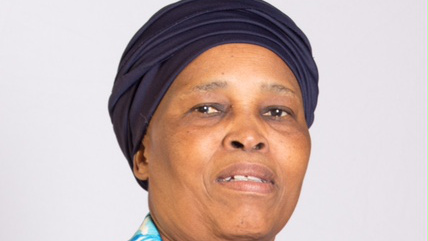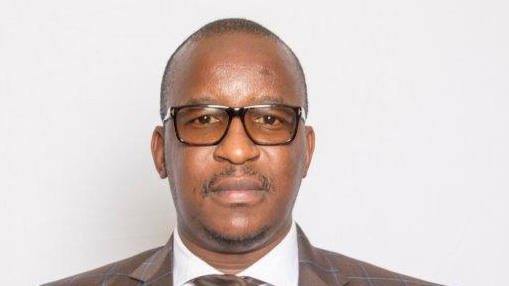Hon. William Matsheke
This Mail & Guardian webinar was sponsored by the Gauteng Provincial Administration (GPL). The speakers were: Hon. Rebecca Phaladi-Digamela, Chairperson of the Health Portfolio Committee; Hon. Matome Chiloane, Chairperson of the Education Portfolio Committee; and Hon. Joe Mpisi, Chairperson of the Finance Portfolio Committee. It was moderated by Hector Motivator, Founder and Manager of The Motivation Company.
Hector Motivator introduced the speakers, and outlined how the webinar would proceed. After the speakers made their addresses, the public would be invited to ask questions, he said.
Motivator: How are you going to deal with the numerous health challenges Gauteng faces?
 Hon. Alphina Ndlovana
Hon. Alphina NdlovanaHon. Rebecca Phaladi-Digamela said the Health Department was given R56-billion for this financial year, of which it spent 98%. The department runs various programmes, such as the district health services, emergency medical services, training services, and health facility management. There is a vaccination programme running for Covid-19, which puts great strain on facilities. The speed of this programme is of great importance; services were restored after there was a fire at Charlotte Maxeke Hospital. Phaladi-Digamela encouraged people to get vaccinated and ignore false information about the vaccine. The Portfolio Committee ensures the Health Department meets its targets and spends its budget on time, and if not, it must account why it has not done so.
Please tell us about the budget for education?
Hon. Matome Chiloane was next to present. He said that the Education Department of Gauteng was allocated R53.4-billion. Most of the budget goes to salaries; the other programmes include administration, Early Childhood Development, independent subsidised schools, special schools, infrastructure development and examinations. Education is a very important sector; in Gauteng there are 2 271 schools and almost 2.4-million learners, of which 1.6-million are on the school feeding programme.
 Hon. Matome Chiloane
Hon. Matome ChiloaneEvery year there are problems with enrollment; we need more schools! In the past year alone, about 120 000 new learners have come into the province. Thus, the budget could be more. Technical schools are a key point to focus on in the future, and more special schools are required. We also need more extramural activities for our children. These are the points that the Portfolio Committee have noted and recommended.
There has been widespread anger about the implementation of the sanitisation programme; what is happening with Covid-19 and the lockdowns?
Our teachers are being vaccinated, despite hiccups; soon all our teachers will be inoculated. Schools are safe spaces, and have been sanitised, so your children are safer in school than if they were running around on the street. There is adequate PPE at schools, and we have been doing surprise checks to see if this is so. We are waiting for a report on the fumigation debacle; heads are expected to roll, we expect some form of action on this.
The Gauteng Treasury controls the budgets for all the departments; quite a responsibility?
Hon. Joe Mpisi said his department has a very small budget — only R754.8-million — with which it must ensure the billions that go to the other departments is accounted for. Programmes are administration, sustainable fiscal resource management, financial governance, provincial supply chain management, municipal financial governance and Gauteng audit services. When we started in 2019 there was much fanfare concerning the Grow Gauteng Together 2030 strategy.
 Hon. Joe Mpisi
Hon. Joe MpisiThe Portfolio Committee does scrutiny on departments, and engages with heads of department, and we ensure that the supply chain management is run properly, which is why we now have an open tender system. Since 2019 seven CFOs either resigned or were asked to leave because of our work. We also ensure that critical projects are budgeted for and delivered; we are the ears and eyes of the people of Gauteng. There have been issues of underspending because of Covid-19 that we are addressing. The five departments that are underspending are infrastructure development, roads and transportation, health, education and social development, and we are engaging with them.
When budgets are allocated, we involve the people of the province. We encourage departments to have contingency funds so they can respond to certain challenges. We are modernising Gauteng, which is small but is also the heartbeat of the country. Corruption will not be tolerated, and the instructions of the Special Investigating Unit must be adhered to.
Questions
A question was raised in which the Portfolio Committee was accused of not inviting members of the public to budget allocation proceedings?
We have met with our stakeholders, said Mpisi, some of whom were from civic society, and this has helped us to improve our budget. On the matter of the “missing R30-million” on a tender, we are following it up. The tender was opened on a Friday and closed on Monday. If we find there was misconduct, people will be arrested.
 Hector Motivator, Founder and Managing Director of The Motivation Company
Hector Motivator, Founder and Managing Director of The Motivation CompanyWhy are there no new hospitals after a year of Covid-19?
We had a problem with the performance of GIFA (Gauteng Infrastructure Financing Agency), an entity linked to the Treasury, so if it is not doing its job, something has to be done. It links various departments and the private sector, but we are not receiving satisfactory reports, so perhaps GIFA must be done away with.
How far is the NHI (National Health Insurance) in its implementation, and who qualifies for the vaccine?
Everybody is eligible for the vaccine, but it must be done through the proper channels, said Phaladi-Digamela. You have to register, and everyone can get the vaccine, whether you have medical aid or not. There has been public participation on the issue of NHI, and we are waiting for the next phase, but we do welcome this programme, which will provide care for all, regardless of their income.
How is the budget for human settlements divided? By population, or people who need housing? Why are there still people waiting for houses? What is the impact on service delivery when budgets are not fully spent?
Yes, there is an impact, said Mpisi, and the members of the public react very quickly in Gauteng when there is insufficient service delivery. There are backlogs; there is a need for schools and housing, although Covid-19 has played a role here. Human Settlements was given an extra R100-million from the national government, but my team is still waiting to see what happened to that money. There is an issue of houses built for South Africans being sold to foreigners. In Johannesburg South, an area earmarked for houses to be built has been taken in a land grab, which created an issue.
What happens to feeding schemes during lockdown?
Chiloane said there is a court order to ensure feeding schemes are available during lockdown. Food parcels are handed out by schools.
Do foreign nationals get vaccines?
Every person who has an ID is able to get vaccinations if they have work permits. Reports are kept to ensure there is no theft or duplication.
What about e-tolls?
Mpisi said there will be an announcement made concerning this soon.
Closing remarks
Mpisi said regarding Human Settlements, it integrates with other departments when building infrastructure. Its budget has been cut, and it must spend its budget. Capital projects must be implemented, because this creates employment. Corruption will not be tolerated; it was our Portfolio Committee that raised the red flag in the PPE scandal. If officials do not take responsibility, we will take note and take steps.
Chiloane said there was an issue raised by an audience member concerning a particular school, and there will be an investigation done on the matter. Education is big, and requires everyone’s hands on deck. The Portfolio Committee has its finger on the pulse and is ensuring the department delivers. We want milestones, so we can measure progress. We must move away from talkshops to action. We want to see improvement in pass rates, and ensure that our schools are safe.
Phaladi-Digamela said the people of the province must rest assured that the Health Department is spending its budget according to plan. People with small problems must think about those with serious issues to reduce overcrowding at hospitals. Let us not drink and drive; and follow the safety protocols for Covid-19. There is budget allocation for building new hospitals, to care for the province’s large population.